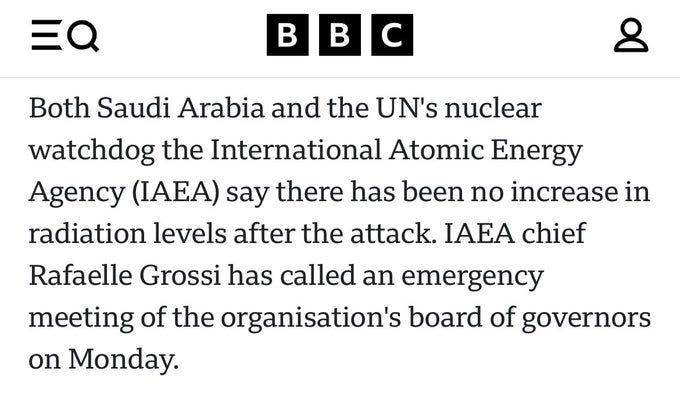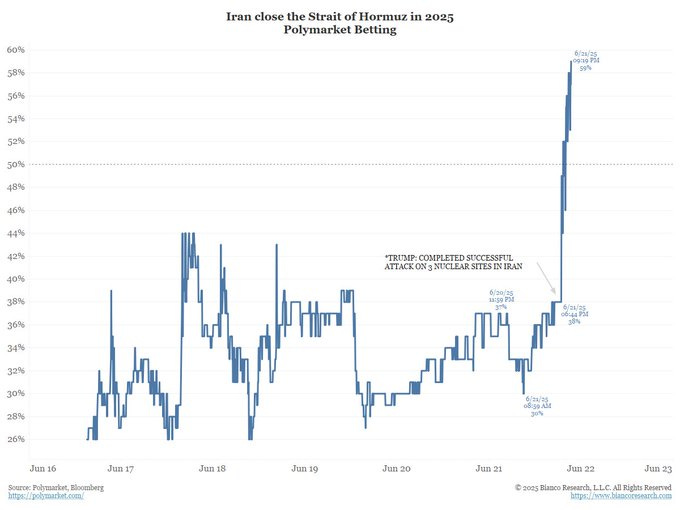Well, obviously, Russia and China are condemning Trump’s early hit and run attack on Iran. Larry Johnson has referred to the attack as “theater”, which seems accurate for now. What that attack could morph into remains to be seen. We remember Trump’s barbaric threats against the Houthis, and how that ended in humiliation for the US—but how does that one about crazy people beating their heads against solid walls go? Iran has announced that their foreign minister will be consulting with Putin tomorrow.
It appears that the attacks accomplished approximately nothing much. No release of radiation is being reported from the official monitoring sources. I’ll be heading off to Mass soon, but I’ve been scanning my usual sources and will return to that after bacon and eggs. And more coffee. Gotta maintain perspective. For now …
Nukes can’t penetrate the earth - that’s why we used to build fallout shelters. All talking points being put out right now are just fantasy football. Nonsense designed to distract as the US is pulled into an unwinnable war.
Grok: Nuclear weapons struggle to destroy deep underground targets like Iran's Fordow facility, as their energy dissipates in dense rock, supporting Pilkington's claim. The U.S. has bunker-buster bombs like the GBU-57, which might reach Fordow, but their effectiveness is uncertain and risks escalation. Diplomacy, like the Iran nuclear deal, is often favored to avoid conflict.
Philip Pilkington @philippilk
3h
Ya’ll ready for extremely high inflation so that America can pretend it can knock out Iran’s nuclear program?
Apparently there has been no increase in radiation levels after the US attack which suggests the US did not, in fact, destroy Iran’s nuclear capacities.
But, now, here’s some interesting chatter about “closing the Strait of Hormuz.” Of course, the real point isn’t to sink big ships and close the Strait physically. The real point is to send prices of energy through the roof. On that score the betting is clear:
However, re the actual closure—which, again, isn’t the real point—it’s not so clear. And, of course, war tech is more advanced now than the last time.
Sal Mercogliano (WGOW Shipping) @mercoglianos
The US bombs Iran but the spice, I mean oil, must flow!
But this does raise the question; can Iran close the Straits of Hormuz?
The answer is: probably not.
The Strait has never been closed and even during the peak of the Tanker War from 1981 to 1988, when 450 ships were attacked, the Strait remained open.
Now, the Iranians do have some weapons that can impact trade:
1. The Iranian Air Force has been degraded and with the Vinson and Nimitz carrier strike groups, along with US Air Force wings in the area, their prospects are low.
2. Missiles - cruise and ballistic - have the potential to hit ships and may be more effective than the Houthis. The issue is that missile strikes against tankers are not always effective. When a missile strikes a loaded tanker, it is like hitting the ground in terms of penetration. What we tend to see is hull damage and loss of cargo. The danger is from a potential fire. Punching a hole in a tanker lets oil out and makes the tanker more buoyant. The danger is hitting a gas carrier.
In fact, of course, the Houthi blockade was EXTREMELY effective. The point is not to sink ships, per se.
3. The Iranian Navy would have very little prospect for success except for the Iranian submarines which could be a wild card.
4. The one weapon that could be the game changer is mines, i.e. SS Bridgeton in 1987. But while mines are dangerous to warships, the size of commercial ships makes a single mine very unlikely to sink a commercial tanker.
So, sail blythely on?
The other issue is that besides oil tankers, there are gas carriers more susceptible to damage. Additionally, Saudi Arabia, Kuwait, Qatar, Bahrain, and UAE are dependent on the Strait for trade via containerships.
The biggest factor that could impact trade is a spike in WAR RISK insurance, which is what happened in December 2023 to force ships to divert around Africa due to the Houthis.
We will have to wait and see what Iran decides and how the US and its allies respond.
Exactly. A spike in costs. That’s what this is really about. And we know that that works.
IRGC Naval command have announced the closure of the Strait of Hormuz. This will collapse what remains of many of the Western economies.
The additional importance of this is that it looks like a clear signal that, far from being the step toward peace that Trump claims he wants—not that he has any cred left—this looks like the beginning of what could be a long war. After all, we are in the middle of the Anglo-Zionist War for global hegemony, so we shouldn’t expect any quick or happy ending.
Philip Pilkington @philippilk
26m
If they really do close the Strait it’s very hard to see how the US doesn’t get pulled in. Trump will be told that the only way to get oil prices down will be to engage the Iranians in the same way they engaged the Houthis. It will fail, of course, but this is still very likely.
WarTranslated @wartranslated
1h
Iran’s jamming GPS in the Strait of Hormuz, messing with ~970 ships, per Windward. UKMTO confirms the interference. Faulty AIS coordinates are screwing up navigation in the Persian Gulf. The IRGC threatens to shut the strait down in hours.
More later. Trump screwing with the good ship MAGA. Nothing looks good.







Meanwhile, missiles are still hitting Tel Aviv. They can't stop the hypersonics so they bombed non-existent nukes instead. Good strategy!
Trump solved a politically intractable Gordian knot. The US & Iran met in Oman two days prior to the strike, the US giving Iran advanced warning to prepare for these (impotent) strikes. Iran's response will be (intentionally) toothless. Both countries now have an off-ramp after stroking their hard-liners. This is essentially a replay of the 2020 Suleimani assassination and Iranian response of deliberately missing our military base.
Pundits are clueless and distraught that wide-spread peace will break out in the Middle East. You heard it here first.